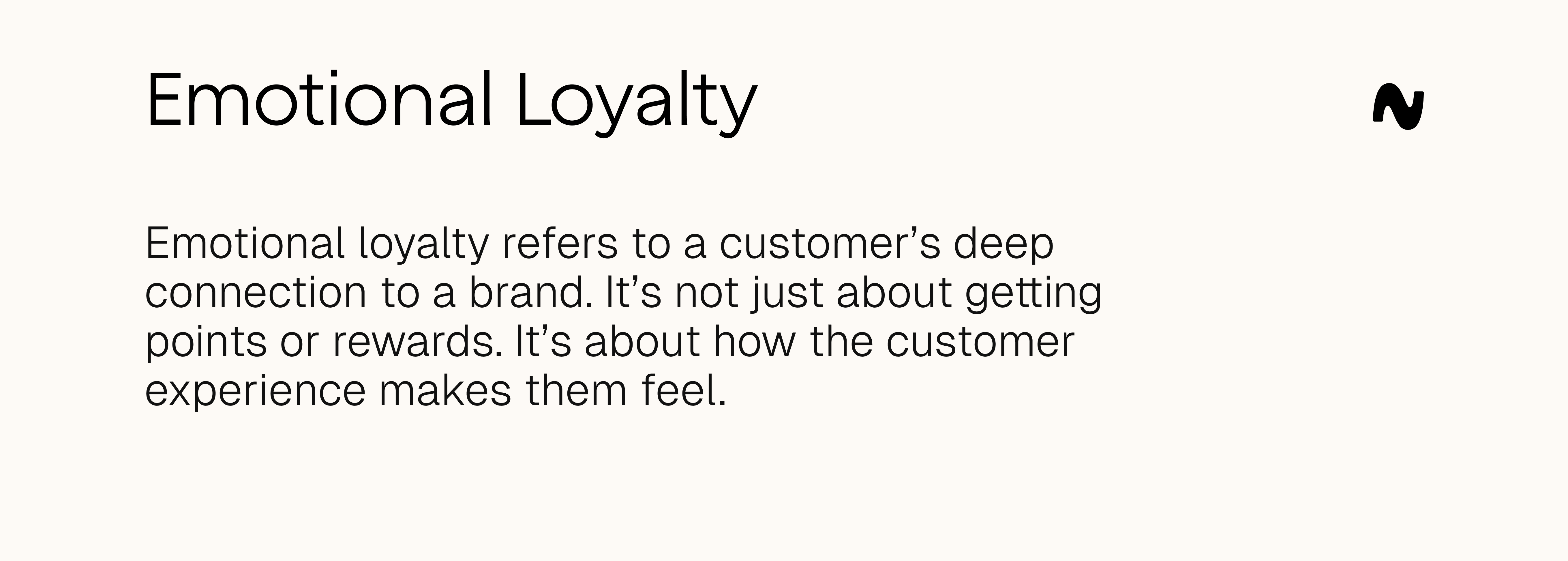August 22, 2025
– 7 minute read
Build Emotional Loyalty and turn customers into lifelong fans. Learn how trust, empathy, and personalized experiences drive lasting connections.

Cormac O’Sullivan
Author
Most loyalty programs focus on discounts and rewards. But those only scratch the surface. Real customer loyalty goes beyond transactions. It’s built on feelings. When customers feel connected to your brand, they stick around even when competitors offer better prices. This deeper, lasting bond is known as emotional loyalty.
Unlike transactional loyalty, which depends on perks, emotional loyalty is rooted in emotional attachment, shared values, and trust. According to Harvard Business Review, emotionally connected customers are more than twice as valuable as highly satisfied ones. They buy more, visit more often, and recommend your brand to others.

Emotional Loyalty Explained
Emotional loyalty refers to a customer’s deep connection to a brand. It’s not just about getting points or rewards. It’s about how the customer experience makes them feel. When people develop an emotional connection with your brand, they don’t just return, they advocate for you.
Why is Emotional Loyalty Important?
Emotional loyalty is more than a feel-good concept. It’s a powerful driver of real business outcomes. Brands that build emotional connections enjoy stronger customer loyalty, higher spending, and better long-term results. Emotional loyalty transforms casual buyers into lifelong fans who feel invested in your success. Let’s explore why it matters so much.
Emotional Bonds that Drive Lifelong Loyalty
Emotional loyalty leads to deep, lasting bonds. When customers feel understood, appreciated, and valued, they keep coming back even when other brands offer similar products or better prices. According to Forbes, emotionally loyal customers have a 306% higher lifetime value than those who are only satisfied. They don’t just stay they engage more, spend more, and become part of the brand story.
This type of long-term loyalty is not easy to replicate. It’s built through every touchpoint, from product quality to how your team handles support. Over time, emotional loyalty creates a stable customer base that supports your business through thick and thin.
Customers Who Become Passionate Brand Advocates
When customers have an emotional attachment to your brand, they naturally spread the word. They tell friends, post online, and become advocates. This positive word of mouth is far more powerful than traditional ads. It’s trusted, free, and scalable.
Emotionally connected customers are more likely to share their stories and encourage others to try your products. According to Study by Nielsen, 92% of people trust recommendations from friends and family over any form of advertising. When you tap into emotional loyalty, your customers become your most effective marketers.
Emotional Loyalty Creates Stability in Shifting Markets
Markets change. Competitors pop up. Prices fluctuate. But emotionally loyal customers are less likely to leave during uncertain times. Their emotional connection gives them a reason to stay. This resilience to market shifts gives your brand a huge competitive advantage.
Loyal customers don’t just look at price, they consider how your brand makes them feel. That emotional bond helps you weather industry disruptions, economic downturns, and evolving trends more easily than brands that rely on transactional perks alone.
Emotional Loyalty Powers Higher Revenue and Growth
Emotionally loyal customers buy more and buy more often. According to a study by PWC, emotionally connected customers have a 52% higher value than those who are just satisfied. They’re less price-sensitive and more open to new offers, upgrades, or add-ons.
This leads to stronger margins and healthier growth. When customers feel emotionally connected, they’re not just buying products; they’re buying into your mission, values, and identity. That connection drives long-term revenue in a way that discounts never can.
Emotionally Loyal Customers Provide Rich Insights
Emotionally loyal customers engage more deeply with your brand. They leave reviews, fill out surveys, and share feedback. This makes them a rich source of valuable consumer insights.
When you have their trust, they’ll tell you what’s working and what’s not. You can use this data to improve your customer experience, personalize offers, and fine-tune your marketing strategy. By learning from your most loyal customers, you make smarter decisions and continue building loyalty in return.
With Leat’s built-in Forms feature, businesses can easily create and send feedback forms to customers. This simplifies the process of collecting insights, allowing you to understand preferences, spot issues early, and make data-driven improvements.
5 Ways to Build Emotional Customer Loyalty
Creating emotional loyalty takes more than a points-based loyalty program. It requires a strategy built on empathy, trust, and human connection. When customers feel seen, heard, and valued, they build a stronger bond with your brand. Here are five proven ways to strengthen that emotional connection and create loyal customers for life.
Making Every Customer Feel Seen
Personalization is key to emotional loyalty. When you tailor your content, offers, and communication to match each customer’s needs, they feel understood. This deepens the emotional attachment. According to McKinsey, 76% of consumers say personalized experiences increase their likelihood of purchasing again.
Exceptional customer service also plays a vital role. Quick, empathetic support builds trust and satisfaction. When customers feel cared for, they stay longer and become vocal advocates. Every interaction is a chance to strengthen the customer experience.
Connecting Through Shared Values
Emotional branding creates a strong connection to the brand by appealing to values and identity. It’s more than a logo or slogan; it’s how you make people feel. Great emotional branding uses storytelling, mission-driven messaging, and tone of voice to foster trust and loyalty.
Brands like Nike and Dove do this well. They don’t just sell products, they sell empowerment, self-worth, and community. When customers feel emotionally aligned with your brand, they stay engaged for the long term.
Celebrating Customers and Their Stories
Encouraging user-generated content (UGC) is another powerful way to build emotional bonds. When customers share their own stories, photos, or experiences with your brand, it creates a sense of belonging. Featuring their content in emails, social posts, or websites makes them feel seen and valued.
This also creates social proof. Other potential customers see real people engaging with your brand and are more likely to trust you. According to a study by Heart Science, 79% of people say UGC highly impacts their purchasing decisions.
With Leat, you can incentivize UGC by rewarding customers with vouchers or perks when they share their experiences.
Creating Joyful Customer Moments
Gamification adds fun and engagement to your loyalty marketing. It taps into emotions like joy, competition, and reward. Points, levels, badges, or interactive challenges keep customers coming back and deepen emotional ties.
Done right, gamification builds habits and excitement around your brand. It turns ordinary transactions into meaningful experiences and encourages repeat engagement.
With Leat, you can easily gamify your loyalty program using built-in tiers, points, and multiplier features. This allows you to reward customers for different actions, create levels of achievement, and make the loyalty experience interactive and engaging
Proving Customers Their Voice Matters.
To build emotional trust, show your customers that you listen and evolve. Use feedback and data to constantly improve your products, services, and support. When customers see that their voice matters, they feel more emotionally invested.
You can also measure emotional loyalty through surveys, sentiment analysis, and engagement metrics. Tracking these helps you understand what drives loyalty and where you need to improve.
4 Emotional Strings to Play to Boost Emotional Loyalty
To create emotional loyalty, brands need more than points and perks. You need to connect on a human level. That means tapping into feelings that drive behavior. Brands that successfully create and control emotional loyalty focus on four key emotional triggers: Surprise & Delight, Empathy, Passion, and Exclusivity. These emotional strings help customers feel truly valued not just rewarded.
Creating Moments That Surprise and Delight
Unexpected rewards leave a lasting impression. When customers receive something they didn’t expect like a birthday gift, an early access perk, or a hand-written thank-you they feel special. This strategy plays directly into the customer experience by evoking positive emotions that deepen trust.
These gestures don’t have to be expensive. Even small surprises, like bonus points or free samples, can go a long way. According to PwC, 73% of customers say the experience is a key factor in their purchasing decisions. Surprise and delight help your brand stand out in a crowded market.
Showing Genuine Care Through Empathy
Empathy builds loyalty by showing you understand and care about your customers' feelings. Whether it's how you respond to a complaint or how you support social causes, customers notice when a brand takes their emotions seriously.
In emotionally intelligent businesses, every touchpoint from email to customer service reflects genuine care. During tough times, empathetic brands are remembered. Emotional loyalty thrives when customers feel that their experiences, struggles, and values matter to the business.
Igniting Passion Around Your Brand
Brands with clear passion attract loyal fans. When your brand stands for something whether it’s sustainability, creativity, or empowerment customers who share that belief form an emotional connection. They see your brand as an extension of themselves.
This kind of emotional attachment turns customers into advocates. People want to support businesses that reflect their own values and identity. That’s why purpose-driven marketing has become a key part of modern loyalty marketing strategies.
Making Customers Feel Valued
Making customers feel part of something exclusive builds a powerful bond. VIP access, early product releases, and special community groups make loyal customers feel appreciated and “on the inside.” This feeling of belonging drives long-term loyalty and engagement.
Exclusivity isn’t just about access it’s about recognition. When customers are treated as insiders, they’re more likely to remain loyal and share their experiences. According to Study, 81% of consumers say loyalty programs make them more likely to continue doing business with brands.
Conclusion
Emotional loyalty is what turns customers into lifelong brand champions. It’s not built through transactions alone, but through real emotional connections by making customers feel valued, understood, and inspired.
By focusing on personalized experiences, empathy, and authentic branding, your business can move beyond transactional loyalty and build something lasting. Tap into the right emotional triggers surprise, empathy, passion, exclusivity and you’ll create a powerful bond that fuels retention, referrals, and revenue.
In a world where price and product can be matched, emotional loyalty is your strongest competitive advantage. Start building it today and watch your customer relationships grow stronger, deeper, and more rewarding.



